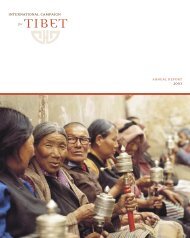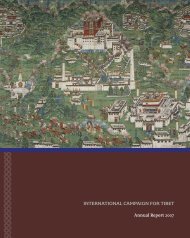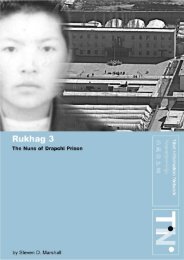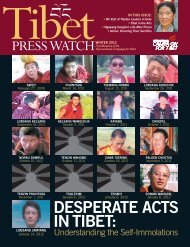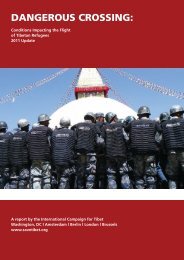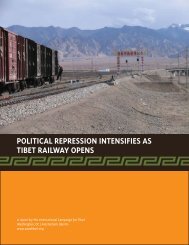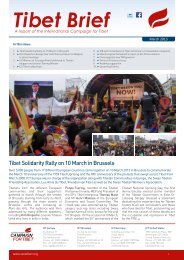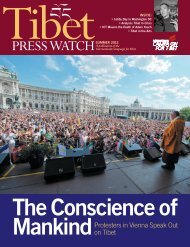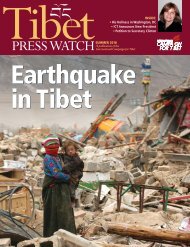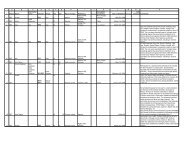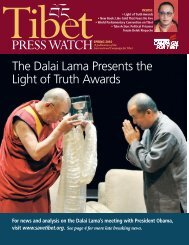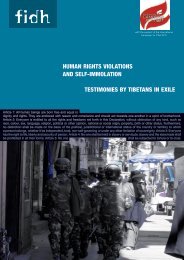download the report - International Campaign for Tibet
download the report - International Campaign for Tibet
download the report - International Campaign for Tibet
You also want an ePaper? Increase the reach of your titles
YUMPU automatically turns print PDFs into web optimized ePapers that Google loves.
INTERNATIONAL CAMPAIGN FOR TIBET<br />
nine most senior politicians in <strong>the</strong> PRC — his main Party<br />
position is Chairman of <strong>the</strong> Chinese People’s Political Consultative<br />
Conference (CPPCC), an advisory body to China’s<br />
national legislature, and a position which has earned him<br />
<strong>the</strong> in<strong>for</strong>mal title “China’s top political advisor” in China’s<br />
English-language press.<br />
Jia appears to have had a limited public role on <strong>Tibet</strong> during<br />
and after <strong>the</strong> protests, restricting his comments to very<br />
broad generalizations about <strong>Tibet</strong>’s status within <strong>the</strong> PRC<br />
and about <strong>the</strong> need <strong>for</strong> CPPCC members to “give full expression<br />
to <strong>the</strong>ir superiority” in <strong>the</strong>ir work on <strong>Tibet</strong>. 24<br />
Chairman of <strong>the</strong><br />
CPPCC, Jia Qinglin<br />
Jia Qinglin led a delegation of central government figures to Lhasa in 2005 to participate<br />
in official celebrations to mark <strong>the</strong> 40th anniversary of <strong>the</strong> founding of <strong>the</strong> TAR,<br />
but o<strong>the</strong>rwise <strong>the</strong>re is little apparent evidence that he has spent much time in <strong>Tibet</strong>,<br />
despite being chairman of working group.<br />
Jia has publicly commented on <strong>the</strong> need to protect <strong>Tibet</strong>an culture, and on <strong>the</strong> positive<br />
role that religions in <strong>the</strong> PRC have to play in society as a whole. However, according<br />
to Jia, religion’s acceptable role is to “promote social harmony”, in o<strong>the</strong>r words,<br />
to con<strong>for</strong>m to <strong>the</strong> Party’s dictats. The implicit understanding is <strong>for</strong> religion to support<br />
and play a secondary role to Party and government attempts to create a “harmonious<br />
society.” 25 Similarly, while Jia has spoken of <strong>the</strong> “long-term historic task” to<br />
protect <strong>Tibet</strong>an culture, that task is primarily assigned to <strong>the</strong> Party and government,<br />
ra<strong>the</strong>r than to <strong>the</strong> people of <strong>Tibet</strong> <strong>the</strong>mselves. 26<br />
Commander of <strong>the</strong> People’s Armed Police,<br />
Wu Shuangzhan<br />
Perhaps <strong>the</strong> most notable change to <strong>the</strong> personnel of <strong>the</strong> Central <strong>Tibet</strong> Work Coordination<br />
Working Group has been <strong>the</strong> <strong>report</strong>ed addition of <strong>the</strong> Commander of <strong>the</strong> People’s<br />
Armed Police (PAP), Wu Shuangzhan. His addition, apparently <strong>the</strong> first time <strong>the</strong><br />
PAP has been represented on <strong>the</strong> working group, strongly suggests that hardened,<br />
militarized security considerations beyond those already taken by ordinary police in<br />
<strong>Tibet</strong> are to be an even more prominent feature of future policy work on <strong>Tibet</strong> —<br />
most likely a direct response to this most recent wave of protests.<br />
Prior to his inclusion in <strong>the</strong> working group and indeed, prior to <strong>the</strong> protests in March<br />
109



